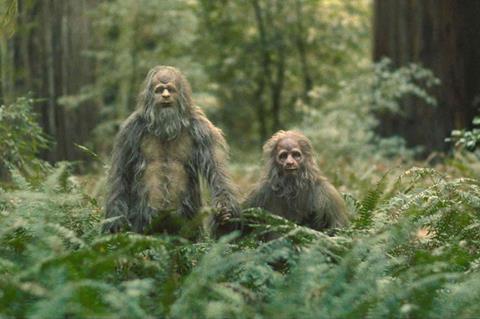Jonathan Romney is longtime contributor to Screen, who also writes for Film Comment, Sight & Sound and The Observer, and teaches at the UK’s National Film and Television School.
Best film

1. Sasquatch Sunset
Dirs. David Zellner and Nathan Zellner
The Zellner brothers don’t yet seem to have become cult heroes, but their latest is their boldest, strangest, most lyrical yet. Four hairy ‘bigfoot’ creatures explore rural America, and with it all the things that come with being human (or sort of human): life, death, sex, curiosity, copious bodily fluids. Surely the most poetic gross-out comedy yet devised, this is also a feat of wordless but intensely expressive acting for the four performers, including Jesse Eisenberg and Riley Keough.
2. Sanatorium Under The Sign Of The Hourglass
Dirs. Quay brothers
Inspired by the work of Polish writer Bruno Schulz, the alchemists of stop-motion animation create an enigmatic fever dream, ostensibly about a man’s search for his father, but ultimately a densely woven tissue of sound, image, texture and suggestion.
3. Grand Tour
Dir. Miguel Gomes
Playing fast and loose with the tradition of the colonial travelogue, Portuguese experimentalist Gomes runs two strands side by side: one, a docu-style mapping of modern Southeast Asia, the other a gorgeously styled period pastiche in which a woman and her fiancé respectively search for love and flee from it.
4. Anora
Dir. Sean Baker
It was wonderful to see this win the Palme d’Or, a prize not usually awarded to films that exude joy. But Baker’s comedy, a buoyant revival of the energies of the screwball tradition, albeit in a harshly realist setting, flew the flag for pleasure — cinematic, social and sexual. Mikey Madison gives a wonderfully brash performance as the young New York sex worker who marries the feckless son of wealthy Russians, then has to face the music. Baker has a fantastic way of orchestrating borderline chaos while keeping the complexities of character in the spotlight: for all the brutality and exploitation depicted, Anora nevertheless celebrates the richer things in human nature.
5. Black Dog
Dir. Guan Hu
A downbeat but visually spectacular story of a Chinese homecoming, with its almost silent loner hero pitting his wits against a stray dog, then finding that the animal is his ally in a hostile, collapsing world. Boasts arguably the most magnificent, and surprising, opening shot of the year.
6. Hard Truths
Dir. Mike Leigh
7. All We Imagine As Light
Dir. Payal Kapadia
8. On Becoming A Guinea Fowl
Dir. Rungano Nyoni
9. Juror #2
Dir. Clint Eastwood
10. La Cocina
Dir. Alonso Ruizpalacios
Best documentary
1. Dahomey
Dir. Mati Diop
Dahomey is more a political-poetical hybrid that addresses colonial history through the imagined musings of a king’s statue, as it is returned to Benin and welcomed by a young African public eager for debate.
2. No Other Land
Dirs. Basel Adra, Hamdan Ballal, Yuval Abraham, Rachel Szor
Made by a Palestinian-Israeli co-operative, this exposé of village demolitions in the West Bank was not only revealing, but given events in the Middle East, timely. An award winner at the Berlinale, it caused reverberations that not only affected the festival itself but also intensified debate in Germany and beyond on how to talk about the Israel-Gaza conflict.
3. Apocalypse In The Tropics
Dir. Petra Costa
A thoughtful, often shocking essay on the fundamentalist powers behind the Jair Bolsonaro presidency in Brazil, showing how the rise of evangelist preachers put a new kind of far-right in office — and could portend its eventual return.
Performance of the year
Fernanda Torres in I’m Still Here
Dir. Walter Salles
This devastating performance is the magnetic centre of Salles’ sobering real-life drama. Torres plays Eunice Paiva, a woman whose family endured persecution under Brazil’s dictatorship in the 1970s. The performance is all the more heart-wrenching for being so perfectly controlled, both in the scenes of everyday life before the nightmare, and through the horror that becomes Eunice’s normality. An additional haunting touch is that the older Eunice of the finale is played by Torres’ mother Fernanda Montenegro, noted for her own unforgettable performance in Salles’ 1998 Central Station.

























No comments yet